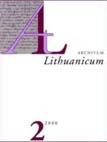Refleksyviojo posesyvumo raiška Mikalojaus Daukšos Postilės perikopėse
Reflexive possessive markers in the pericopes of Mikalojus Daukša’s Postil
Author(s): Bronius MaskuliūnasSubject(s): Language and Literature Studies
Published by: Lietuvių Kalbos Institutas
Keywords: constructions; reflexive possessive markers; pericopes; Daukša; Postil; Wujek; Vulgate; Vilentas’ Euangelijos bei Epistolos; pronominal; pronouns; language; possessivity; verb
Summary/Abstract: The article gives an analysis of the constructions with reflexive possessive markers in the pericopes of Daukša’s Postil and of the corresponding constructions in the third edition of Wujek’s Postil. In those cases where different constructions are found in Daukša and in the third edition of Wujek, other versions of Wujek’s Postil prior to the publication of Daukša’s text (viz., the 1st, 2nd and 4th editions) were consulted. The analysis of reflexive possessive markers confirms the assumption, already formulated before, that in translating the pericopes Daukša sometimes diverged from Wujek’s text and had recourse to alternative constructions. Such instances are, however, quite rare. Out of a number of more than 250 constructions with reflexive possessive markers, only some seven per cent showed divergences. A comparison of those places where Daukša and Wujek have divergent constructions with subsidiary sources shows that in such instances Daukša’s renderings usually coincide with Vilentas’ Euangelijos bei Epistolos, or they are individual creations. Direct influence of the Vulgate on the constructions in question can only be observed in rare instances. The predominant reflexive possessive markers in Daukša’s pericopes are pronominal. Both authors, Daukša and Wujek, show a strong predilection for a type of pronominal reflexive marking that is, in fact, uncharacteristic of Lithuanian as well as of Polish, viz., they use 1st and 2nd person pronouns instead of reflexive pronouns. This can be explained with the influence of Latin and Greek, the languages from which the gospel passages were translated. In those cases where Wujek has other constructions, the use of this model in DP should be viewed in connection with Vilentas, as in the latter’s Euangelijos bei Epistolos this foreign model of reflexive marking is even more frequent. Marking of reflexive possessivity on the verb is quite rare in the pericopes dealt with in this paper, and when it does occur, Daukša’s and Wujek’s texts are usually in agreement.
Journal: Archivum Lithuanicum
- Issue Year: 2000
- Issue No: 02
- Page Range: 107-124
- Page Count: 18
- Language: Lithuanian

